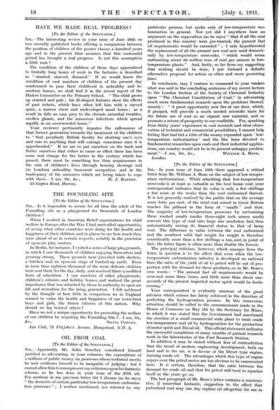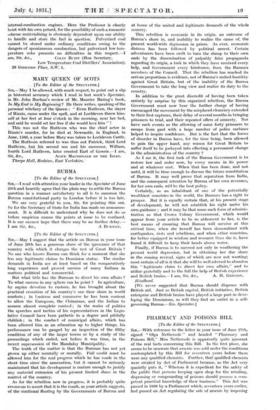[To the Editor of the SrEcmioa.] .
SIR,—In your issue of June 13th there appeared a critical letter from Mr. William A. Bone on the subject of low-temper- ature carbonization. While admitting that low-temperature semi-coke is at least as valuable as the best house coal, your correspondent indicates that its value is only a few shillings a .ton more at the works than the coal carbonized thereat. It is not generally realized by the public that on the average some forty per cent, of the total coal mined in Great Britain reaches the pithead in the form of " smalls " and dust. The majority of low-temperature processes by carbonizing these washed smalls (under three-eight inch screen mesh) convert this type of coal into large size smokeless fuel, thus automatically raising its financial status to that of lump coal. The difference in value between the coal carbonized and the resultant solid fuel weight for weight is therefore considerably more than a few shillings a ton, and, in. point of fact, the latter figure is often more than double the former.
The principal criticism, however, which emerges from. the letter in question is to the effect that even when the low- temperature carbonization industry is developed on national lines the ratio of the yield of oil to petrol will be out of pro- portion with the demand for these products, or, in Mr. Bone's own words : "The present fuel oil requirements would be over-met some three times, and little more than about one- seventh of the present imported motor spirit would be forth- coming."
Your correspondent is evidently unaware of the great advance which science has lately achieved in the direction of perfecting the hydrogenation process. . In this connexion, attention should be called to the announcement made in the House of Commons on May 5th by the Secretary for Mines, in which it was stated that the Government had sanctioned the erection of a small commercial, scale plant to treat crude low-temperature coal oil by hydrogenation for the production of motor spirit and Diesel oil. This official statement indicates the successful completion of many months of patient research work in the laboratories of the Fuel Research Station.
In addition it may be stated without fear of contradiction
that the trend of modern engineering development, both on land and in the air, is in favour of the Diesel type engine, burning crude oil. The advantages which this type of engine enjoys over the petrol motor are too obvious to be enumerated here. It is certain, therefore, that the ratio between the demand for crude oil and that for petrol will tend to equalize
itself as the years go on. . ,
The last paragraph of Mr. Bone's letter contains a construc- tive, if somewhat fantastic, suggestion to the effect that pulverized coal may one day, replace oil altogether for use in
internal-combustion. engines.. Here the Professor is clearly hoist with his own petard, for the possibility of such a romantic scheme materializing is obviously dependent upon our ability to handle and store the fuel in question. Pulverized coal cannot be stored under ordinary conditions owing to the dangers -of spontaneous combustion, but pulverized low tem- perature coke presents • no difficulties. in this respect.—!
am, Sir, &c., - CoLTA Buisx (Hon Secretary, Low Temperature Coal Distillers' Association). .28 Grosvenor Place, SW . 1.











































 Previous page
Previous page